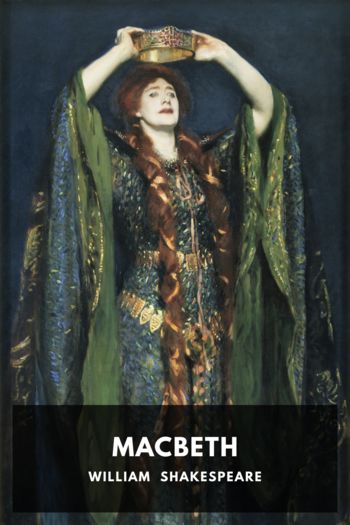Macbeth - William Shakespeare (best mystery novels of all time txt) 📗

- Author: William Shakespeare
Book online «Macbeth - William Shakespeare (best mystery novels of all time txt) 📗». Author William Shakespeare
Another part of the field.
Alarums. Enter Macbeth. MacbethThey have tied me to a stake; I cannot fly,
But, bear-like, I must fight the course. What’s he
That was not born of woman? Such a one
Am I to fear, or none.
No; though thou call’st thyself a hotter name
Than any is in hell.
The devil himself could not pronounce a title
More hateful to mine ear.
Thou liest, abhorred tyrant; with my sword
I’ll prove the lie thou speak’st. They fight and Young Siward is slain.
Thou wast born of woman
But swords I smile at, weapons laugh to scorn,
Brandish’d by man that’s of a woman born. Exit.
That way the noise is. Tyrant, show thy face!
If thou be’st slain and with no stroke of mine,
My wife and children’s ghosts will haunt me still.
I cannot strike at wretched kerns, whose arms
Are hired to bear their staves: either thou, Macbeth,
Or else my sword with an unbatter’d edge
I sheathe again undeeded. There thou shouldst be;
By this great clatter, one of greatest note
Seems bruited. Let me find him, fortune!
And more I beg not. Exit. Alarums.
This way, my lord; the castle’s gently render’d:
The tyrant’s people on both sides do fight;
The noble thanes do bravely in the war;
The day almost itself professes yours,
And little is to do.
We have met with foes
That strike beside us.
Another part of the field.
Enter Macbeth. MacbethWhy should I play the Roman fool, and die
On mine own sword? whiles I see lives, the gashes
Do better upon them.
Of all men else I have avoided thee:
But get thee back; my soul is too much charged
With blood of thine already.
I have no words:
My voice is in my sword: thou bloodier villain
Than terms can give thee out! They fight.
Thou losest labour:
As easy mayst thou the intrenchant air
With thy keen sword impress as make me bleed:
Let fall thy blade on vulnerable crests;
I bear a charmed life, which must not yield
To one of woman born.
Despair thy charm;
And let the angel whom thou still hast served
Tell thee, Macduff was from his mother’s womb
Untimely ripp’d.
Accursed be that tongue that tells me so,
For it hath cow’d my better part of man!
And be these juggling fiends no more believed,
That palter with us in a double sense;
That keep the word of promise to our ear,
And break it to our hope. I’ll not fight with thee.
Then yield thee, coward,
And live to be the show and gaze o’ the time:
We’ll have thee, as our rarer monsters are,
Painted on a pole, and underwrit,
“Here may you see the tyrant.”
I will not yield,
To kiss the ground before young Malcolm’s feet,
And to be baited with the rabble’s curse.
Though Birnam wood be come to Dunsinane,
And thou opposed, being of no woman born,
Yet I will try the last. Before my body
I throw my warlike shield. Lay on, Macduff,
And damn’d be him that first cries, “Hold, enough!” Exeunt, fighting. Alarums.
Some must go off: and yet, by these I see,
So great a day as this is cheaply bought.
Your son, my lord, has paid a soldier’s debt:
He only lived but till he was a man;
The which no sooner had his prowess confirm’d
In the unshrinking station where he fought,
But like a man he died.
Ay, and brought off the field: your cause of sorrow
Must not be measured by his worth, for then
It hath no end.
Why then, God’s soldier be he!
Had I as many sons as I have hairs,
I would not wish them to a fairer death:
And so, his knell is knoll’d.
He’s worth more sorrow,
And that I’ll spend for him.
He’s worth no more:
They say he parted well, and paid his score:
And so, God be with him! Here comes newer comfort.
Hail, king! for so thou art: behold, where stands
The usurper’s cursed head: the time is free:
I see thee compass’d with thy kingdom’s pearl,
That speak my salutation in their minds;
Whose voices I desire aloud with mine:
Hail, King of Scotland!
We shall not spend a large expense of time
Before we reckon with your several loves,
And make us even with you. My thanes and kinsmen,
Henceforth be earls, the first that ever Scotland
In such an honour named. What’s more to do,
Which would be planted newly with the time,
As calling home our exiled friends abroad
That fled the snares of watchful tyranny;
Producing forth the cruel ministers
Of this dead butcher and his fiend-like queen,
Who, as ’tis thought, by self and violent hands
Took off her life; this, and what needful else
That calls upon us, by the grace of Grace,
We will perform in measure, time and place:
So, thanks to all at once and to each one,
Whom we invite to see us crown’d at Scone. Flourish. Exeunt.
Macbeth
was published in 1606 by
William Shakespeare.
This ebook was produced for
Standard Ebooks
by
Emma Sweeney,
and is based on a transcription produced in 1993 by
Jeremy Hylton
for the
Massachusetts Institute of Technology
and on digital scans available at the
HathiTrust Digital Library.
The cover page is adapted from
Ellen Terry as Lady Macbeth,
a painting completed in 1889 by
John Singer Sargent.
The cover and title pages feature the
League Spartan and Sorts Mill Goudy
typefaces created in 2014 and 2009





Comments (0)